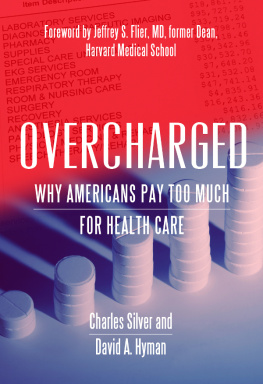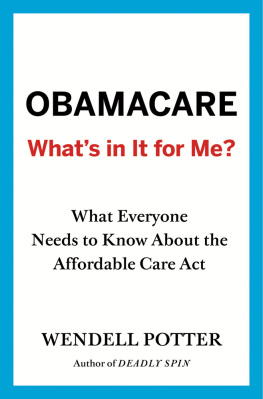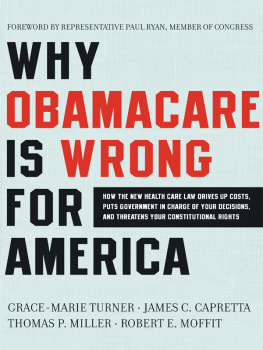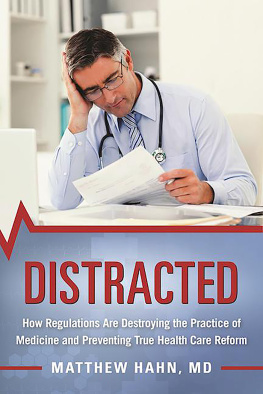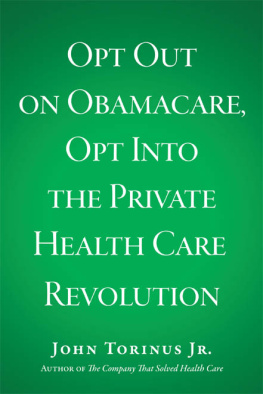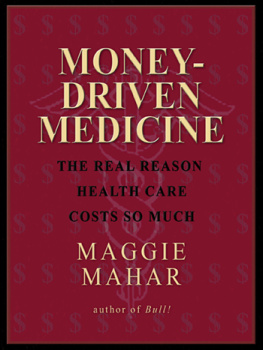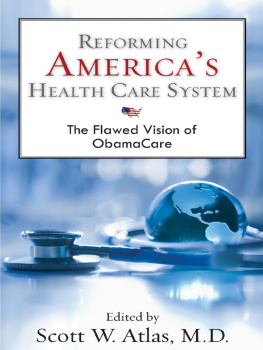Congress is just not capable of being the manager of a health care system and yet its largely Congress today that has that responsibility. It hasnt worked for the last 50 years. Itll work even less in the next 50.
Former U.S. Senator Thomas Daschle (D)
We are putting people in a position where, when they are buying health care, it is like going to the grocery store and having a grocery insurance policy, where 95 percent of what you put in your grocery basket is going to be paid for by grocery insurance. Needless to say, if you had such a policy, you would eat differently, and so would your dog.
Former U.S. Senator Phil Gramm (R)
So youve got this crazy system where all of a sudden, 25 million more people have health care and then the people that are out there busting it, sometimes 60 hours a week, wind up with their premiums doubled and their coverage cut in half. Its the craziest thing in the world.
The problems with Americas health care system are many and varied. Thats why there is no general guide to all of them. Instead, there are thousands of books and articles about specific difficulties, such as the mistreatment of prostate cancer in men, the politics of health care reform, outrageous hospital charges, or fraud in the prescription drug business.
Although many of these writings are excellent, they fail to convey a sense of the whole. An intelligent person wants to know, at the most general level, why our health care system is so dysfunctional. What are the root causes of spiraling costs, mediocre quality, and limited access? Why is more than $1 trillionone out of every three dollars that passes through the systemlost to fraud, wasted on services that dont help patients, or otherwise misspent? Why do hospitalized patients receive bills that are laden with inflated charges, that come out of the blue from out-of-network providers, or that demand payment for services that werent delivered? Why does the EpiPen, an old technology that contains $1 worth of medicine, cost $600? Do questions like these require separate answers? Or are the answers connected? Are there core drivers of the health care systems many pathologies?
We believe that an array of the American health care systems most important shortcomings stem from a few root causes. We also think that it is important to lay these fundamental drivers bare for everyone to see. That is what we do in this book. We describe a range of different problems with the health care system, identify the structures that generate them and connect them, and show how they can all be addressed by means of reforms that reduce political control of the health care sector and that replace third-party payment for medical services with direct purchasing.
The need to think deeply and clearly about root causes could hardly be greater. As we write this, Republicans have been trying (so far with limited success) to repeal Obamacare. But they havent figured out how to make the health care system better. Democrats are playing defense, but even they agree that Obamacare is in trouble and needs to be fixed.
Unfortunately, neither Republicans nor Democrats have the faintest intention of implementing policies with any real potential to make the health care system measurably better. Democrats see Obamacare as a solution, but all it really offered was more of everything that gave us the dysfunctional health care system we had before: more insurance, more Medicaid, more tax exemptions and subsidies, and more political control. Plowing tens of millions of new people and hundreds of billions of new dollars into a dysfunctional system was a recipe for disaster, as was giving even more control of that system to politicians. Republicans see Obamacare as the problem, but the health care system was riddled with pathologies long before Obamacare came along. Republicans havent even focused on the problems that need fixing, much less offered serious proposals to address them.
To make health care better and cheaper for all Americans, we must change the way we pay for medical services. That is what this book explains. Our system costs too much and delivers too little because we pay for health care the wrong way. Instead of routing dollars through insurers, public payers like Medicare and Medicaid, and politicians, consumers must control the money. They must choose the health insurance plans and medical services they use and pay for them directly, the same way they choose and pay for goods and services of other types. If and when consumers take charge, the American health care system will quickly improve. Until then, it will not.
The prospect that Congress might reform the payment system will scare many people, as the possibility that it might repeal Obamacare already has. But if there is any lesson to be learned from the fight over Obamacare, it is that Congress is unlikely to implement the changes we envision. Our proposals would subject medical providers to great pressure to deliver more while charging less. Health care providers want to operate without such pressure, so the lobbyists who represent them in Washington would do their best to kill our proposals long before they reached the floor of the House or the Senate.
Fortunately, even if our elected representatives leave private insurance, Medicare, and Medicaid as they are, pressure for improvement will build from below. It will come from people who are tired of being overcharged and underserved, and who decide to do something about it by taking their business to providers who are better and cheaper. In other words, pressure to improve will come from consumers who buy medical treatments directly.
There are millions of these people already, including those who bought high-deductible Obamacare policies, and those who obtained high-deductible policies through their employers. They are driving the expansion of the retail health care sector, which makes cheap and convenient services available to anyone who walks through the door. And, as time goes by, the uninsured population will grow because both private insurance and public programs are bound to shrink. Comprehensive insurance will become ever more expensive, so fewer healthy people will buy it, particularly now that the modest tax penalties Obamacare once imposed on the uninsured are gone. As the declining ratio of tax-paying workers to tax-consuming seniors wreaks havoc with Medicares finances, Congress will have to cut back on benefits, increase seniors deductibles and copayments, and raise the eligibility age, lest the deficit explode. Rising costs will pressure states to put clamps on Medicaid too, meaning that a greater fraction of the rising cost of health care will be shouldered by the poor and near poor.
Like it or not, the country seems bound to have many more people who are financially responsible for their own health care. With a little luck, their purchasing decisions will force health care providers to improve without any help from Congress.
We wrote this book to communicate the underappreciated-but-hopeful message that health care will get better and cheaper as consumers exert pressure from below. Of course, there will be plenty of turmoil along the way. Health care providers will use every means at their disposal to ensure that tax money and insurance dollars continue to flow into their coffers. Medicare and Medicaid recipients will experience uncertainty and deprivation as their benefits are frozen or curtailed. Congress will feel great pressure to make insurance more affordable by dispensing subsidies and exempting all amounts spent on health care from taxation. But we are confident that pressure from an army of buyers who have to pay for medical treatments themselves will increasingly bring ordinary market forces to bear on American health care providers, to good effect.

